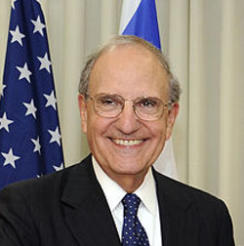International peace envoy and former US Senate majority leader, George Mitchell held an audience of sector leaders spellbound last night, when delivering NCVO’s annual Hinton Lecture.
Senator Mitchell recalled his role as a main architect of the 1998 Good Friday Agreement in Northern Ireland, saying his memory of meeting seriously-injured survivors of the Omagh bombing would be seared on his memory for the rest of his life. “They didn’t want to speak about themselves; they just urged me to keep going with my peace efforts,” he said.
“The voluntary sector was founded by, and functions on, the passion and determination of selfless individuals like that; men and women of courage and commitment who make our lives better through what they do. That was Nicholas Hinton.”
In a tour-de-force of a speech, Senator Mitchell outlined the three main threats he sees to democracy around the world. The post-World War II alliance between the UK and US had led to many great achievements, notably the establishment of the UN, Nato and the EU. The current economic problems in Europe must not be allowed to undermine those achievements, he said.
“The development of free nations must be reinvigorated; the same leadership we had back then is still needed now.”
Senator Mitchell identified nuclear proliferation and the use by some countries of military and economic power, without it being based on underlying democratic principles, as major threats to the world order we have known for almost 70 years.
“For too many people, military power is seen as replacing these democratic principles, rather than serving them.”
Last night’s 15th annual Hinton lecture was organised by NCVO in memory of Nicholas Hinton, the highly-respected former chief executive of NCVO and Save the Children, who died while on a peace-keeping mission to Croatia in 1997. Hinton was also the founder of the International Crisis Group, where Senator Mitchell was chairman.









